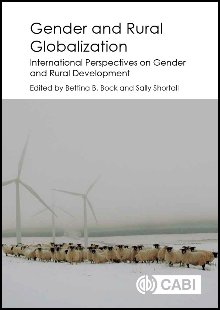McVay. Lori. “Rural Women Leaders: Identity Formation in Rural Northern Ireland.” In Gender and Rural Globalization: International Perspectives on Gender and Rural Development, edited by Bettina Bock and Sally Shortfall, 170-184. Boston: CABI, 2017.
This chapter examines the identity of women leaders in Northern Ireland in order to understand how these women managed to become leaders, against all traditional odds, and which events and life choices shaped their identity. In doing so, it elaborates how growing up in a rural context may nurture women’s confidence and readiness to lead in the sense that taking on responsibility is considered part of a rural lifestyle.


